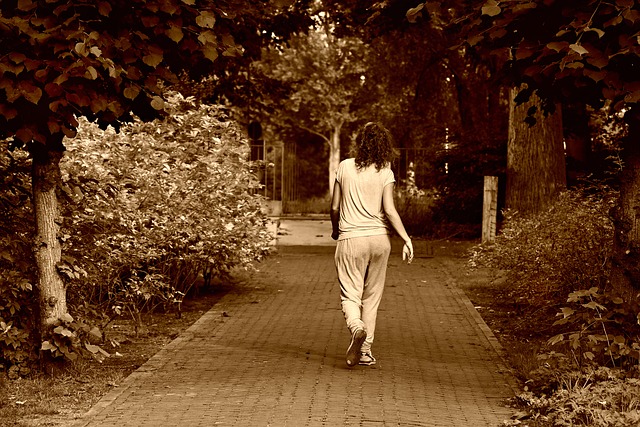Walking is one of the easiest ways to exercise. You can do it almost anywhere and at any time. Walking is also inexpensive. All you need is a pair of comfortable shoes.
Walking will:
- Give you more energy
- Make you feel good
- Help you to relax
- Reduce stress
- Help you sleep better
- Tone your muscles
- Help control your appetite
- Increase the number of calories your body uses
For all these reasons, people have started walking programs. If you would like to start your own program, read and follow the information provided here.
Answer the following questions before you begin a walking program:
- Has your doctor ever told you that you have heart trouble?
- When you exercise, do you have pains in your chest or on your left side (neck, shoulder or arm)?
- Do you often feel faint or have dizzy spells?
- Do you feel extremely breathless after mild activity?
- Has your doctor told you that you have high blood pressure?
- Has your doctor told you that you have bone or joint problems, like arthritis, that could get worse if you exercise?
- Are you over 50 years old and not use to a lot of exercise?
- Do you have a condition or physical reason not mentioned here that might interfere with an exercise program?
If you answered yes to any of these questions, please check with your doctor before starting a walking program or other form of exercise.
How Do I Start a Walking Program?
It is important to design a program that will work for you. In planning your walking program, keep the following points in mind:
- Choose a safe place to walk. Find a partner or group of people to walk with you. Your walking partner(s) should be able to walk with you on the same schedule and at the same speed.
- Wear shoes with thick flexible soles that will cushion your feet and absorb shock.
- Wear clothes that are right for the season. Cotton clothes for the summer help to keep you cool by absorbing sweat and allowing it to evaporate. Layer your clothing in the winter, and as you warm up, you can take off some layers.
- Stretch before you walk. See the warm up exercises here.
- Think of your walk in three parts. Walk slowly for 5 minutes. Increase your speed for the next 5 minutes. Finally, to cool down, walk slowly again for 5 minutes.
- Try to walk at least three times per week. Add 2 to 3 minutes per week to the fast walk. If you walk less than three times per week, increase the fast walk more slowly.
- To avoid stiff or sore muscles or joints, start gradually. Over several weeks, begin walking faster, going further, and walking for longer periods of time.
- The more you walk, the better you will feel. You also use more calories.
Keep safety in mind when you plan your route and the time of your walk.
- Walk in the daytime or at night in well-lighted areas.
- Walk in a group at all times.
- Notify your local police station of your group's walking time and route.
- Do not wear jewelry.
- Do not wear headphones.
- Be aware of your surroundings.
Before you start to walk, do the stretching exercises shown here. Remember not to bounce when you stretch. Perform slow movements and stretch only as far as you feel comfortable.
 | Side Reaches Reach one arm over your head and to the side. Keep your hips steady and your shoulders straight to the side. Hold for 10 seconds and repeat on the other side. |
Lean your hands on a wall with your feet about 3-4 feet away from the wall. Bend one knee and point it toward the wall. Keep your back leg straight with your foot flat and your toes pointed straight ahead. Hold for 10 seconds and repeat with the other leg. |  |
 | Lean your back against a wall. Keep your head, hips, and feet in a straight line. Pull one knee to your chest, hold for 10 seconds, then repeat with the other leg. |
Pull your foot to your buttocks with your opposite hand. Keep your knee pointing straight to the ground. Hold for 10 seconds and repeat with the other foot. |  |
Walking right is very important.
- Walk with your chin up and your shoulders held slightly back.
- Walk so that the heel of your foot touches the ground first. Roll your weight forward.
- Walk with your toes pointed forward.
- Swing your arms as you walk.
| Warm up Time | Fast Walk Time* | Cool Down Time | Total Time | |
|---|---|---|---|---|
| Week 1 | Walk slowly 5 min. | Walk briskly 5 min. | Walk slowly 5 min. | 15 min. |
| Week 2 | Walk slowly 5 min. | Walk briskly 8 min. | Walk slowly 5 min. | 18 min |
| Week 3 | Walk slowly 5 min. | Walk briskly 11 min. | Walk slowly 5 min. | 21 min. |
| Week 4 | Walk slowly 5 min. | Walk briskly 14 min. | Walk slowly 5 min. | 24 min. |
| Week 5 | Walk slowly 5 min. | Walk briskly 17 min. | Walk slowly 5 min. | 27 min. |
| Week 6 | Walk slowly 5 min | Walk briskly 20 min. | Walk slowly 5 min. | 30 min. |
| Week 7 | Walk slowly 5 min. | Walk briskly 23 min. | Walk slowly 5 min. | 33 min. |
| Week 8 | Walk slowly 5 min. | Walk briskly 26 min. | Walk slowly 5 min. | 36 min. |
| Week 9 & Beyond | Walk slowly 5 min. | Walk briskly 30 min. | Walk slowly 5 min. | 40 min. |
increase the fast walk time more slowly.
Additional Resources










